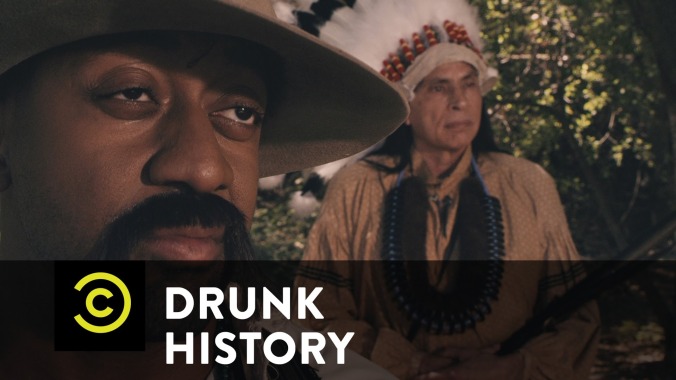Meet the man who might have been the real-life Lone Ranger

This week’s entry: Bass Reeves
What it’s about: The real-life Lone Ranger. Reeves was a U.S. marshal in the “Indian Territory” that became Oklahoma. He used marksmanship and detective skills to bring more than 3,000 outlaws to justice, and it’s rumored that the popular radio/TV/film series The Lone Ranger was based on his exploits. However, unlike the fictional Kemosabe, Reeves was a former slave.
Biggest controversy: While Reeves’ connection to the Lone Ranger series has long been touted (episodes of both Gunslingers and Legends And Lies: The Real West have been called “Bass Reeves: The Real Lone Ranger”), and his real-life exploits rival anything in fiction, there’s actually no evidence that the radio series’ creators had Reeves in mind. (The Lone Ranger Wiki page suggests it was more likely John Reynolds Hughes, a Texas Ranger who was a subject of Zane Grey’s 1915 book The Lone Star Ranger.) The rumors of a Reeves connection may have come from a biography that called him “the closest real person to resemble the Lone Ranger.”
Strangest fact: Reeves may have escaped slavery over a card game. Born in 1838, Reeves’ family was enslaved by Arkansas state legislator William Steele Reeves. Bass most likely served William Reeves’ son, George Reeves, a sheriff who would eventually become speaker of the Texas House Of Representatives. After the Civil War broke out, Bass “parted company with” George Reeves, as Wikipedia delicately puts it, allegedly after beating up George in a dispute over a card game. No doubt fearing the reprisals that would come from beating up a white man, and a sheriff at that, Reeves fled to Indian territory.
Thing we were happiest to learn: Reeves’ first few years of freedom prepared him for his future career. He lived among the Cherokee, Seminole, and Creek, learned all three languages, and became familiar with each group’s culture and region. In 1875, when new U.S. Marshal James Fagan was directed to hire 200 deputies, he already knew Reeves by reputation as someone who understood the territory and could pass between black, white, and Native American communities with ease. He hired him as the first African American federal marshal west of the Mississippi, a post Reeves held for 32 years. Over the course of arresting more than 3,000 felons, including some of the most dangerous criminals of the day, Reeves was never wounded, and doesn’t seem to have suffered worse than having his hat and belt shot off (on different occasions).
Thing we were unhappiest to learn: Reeves had some tough cases. His son Bennie Reeves was accused of murdering his wife. Bass insisted on taking responsibility himself, personally tracking down his son and bringing him to justice. Bennie served time in Leavenworth, and was reportedly a model citizen for the rest of his life after his release. (Bass also had 10 other children who weren’t accused of murder, so that’s a pretty good record all in all.)
Reeves himself was once on trial for murder, having been accused of killing a posse’s cook. He was represented by a friend who was a former U.S. Attorney, and the judge was the same one Reeves served under as a marshal, known to consider Reeves one of his most effective lawmen. The details of the trails aren’t known, but Reeves was acquitted and continued as a marshal until Oklahoma statehood in 1907. Reeves became a police officer in Muskogee, but by that point, at age 68, his health was failing. He retired two years later, and died of Bright’s disease the year after that.
Also noteworthy: While there probably wasn’t a long-running radio serial based on Reeves’ exploits, Hollywood’s making up for lost time. A 2006 biography spurred renewed interest in Reeves’ life story, and since then, James A. House starred in 2010’s Bass Reeves video, Morgan Freeman is developing a miniseries for HBO, and Chloé Zhao (The Rider) is set to direct a Reeves biopic for Amazon Studios. Jaleel White also portrayed Reeves in the Drunk History episode “Oklahoma.”
Best link to elsewhere on Wikipedia: Colonel George Reeves, the son of Bass Reeves’ former master, had a long, successful career in politics before dying from rabies. The oft-misunderstood disease is a virus that causes an inflammation of the brain. The virus can lie dormant from anywhere from a week to a year, and, “once symptoms appear, the result is nearly always death,” although it’s curable if treated before symptoms appear.
Further down the Wormhole: Occasionally we look at links for the previous section, and find something worth exploring with more depth. While the Cherokee and their plight on the Trail Of Tears is widely known as an ugly and tragic part of American history, the similar story of the Creek, or Muscogee, is less known, but includes terraforming, war on multiple fronts, and a diaspora that continues to this day. We’ll learn more next week.